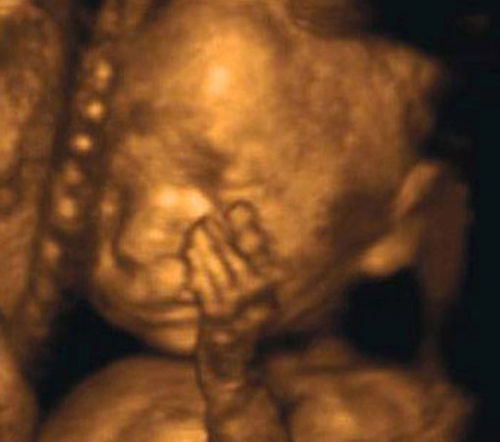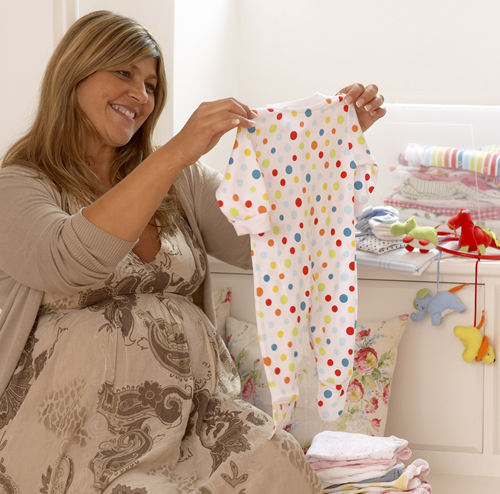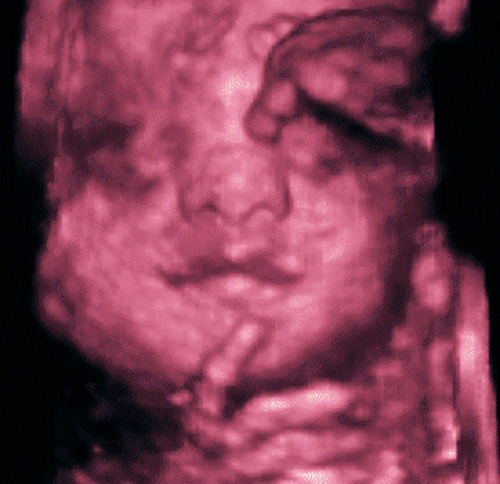You are 25 Weeks and 5 Days 100 days to go…
It will be some years before you’ll know your child’s personality, but even in the uterus she has some likes and dislikes.
Your baby today
With fingers held up to the cheek, eyes closed, and the ear just
visible in the background, this image shows a very peaceful baby. To
the left, the umbilical cord is visible on its way to the placenta, seen
further to the left.

As your baby continues
to grow you may find yourself wondering what she is going to be like:
easy going or demanding? Funny or serious? Happy playing alone or
social? Boisterous or quiet? You may believe that babies are born with
their personalities already developed, or that they are born with a
personality that is further shaped and developed as they grow. The
nature versus nurture debate rages on and, in all likelihood, it’s a
combination of the two: some aspects of your child’s personality may
already be decided before birth, some may be developed later in
childhood, or even adulthood.
You may already have
noticed that your baby has certain likes or dislikes, for example she
may kick or move in response to loud music or to a certain genre of
music, though it’s difficult to tell whether the increased movements
mean your baby is enjoying it or not.
Your baby is very
stimulated inside the uterus. By this third trimester, she can feel
vibrations, and hear not just sounds from inside your body, such as your
heartbeat, but also sounds from outside, such as people talking. Your
baby is aware of when you’re moving or are still and you may have
noticed a pattern of movements from her, not least that she
“communicates” more when you’re resting.
As part of her activity,
she will continue practicing for life after the birth, with breathing
movements and swallowing—and she may even suck her thumb.
Buying for your baby
Preparing for your baby’s arrival doesn’t have to break the bank.
Babies soon outgrow
onesies and get little wear out of them so you may be offered some from
friends. You can cut the feet off the onesies if they’re too tight.

What your baby needs:
Milk:
breast milk is free (and best for your baby). For bottle-feeding,
you’ll need bottles, nipples, formula, and a sterilizing system.
Diapers: you’ll need to decide between disposables, reusables, or a combination of the two (see Choosing diapers). Whichever type you choose, you’ll also need to use diaper wipes.
Somewhere to sleep:
she can sleep in a crib from birth if you don’t want to buy a bassinet.
Even if you buy a used crib, you should always buy a new mattress.
Lots of onesies: don’t buy too many newborn size.
Transportation: a stroller (with a lie-option until your baby can sit up), or a sling or frontpack to carry your baby.
Car seat: this is a legal requirement for car travel. Don’t buy used.
What your baby can live without:
Changing station: a mat (or towel) on the floor is cheaper and safer.
Bottle warmer: heat in a jug instead.
Designer wardrobe.
Pack-n-Play: borrow one if necessary.
Save
money by shopping online. Scour second-hand shops and yard sales. Swap
clothes and toys with friends, family members, and other parents.
You are 25 Weeks and 6 Days 99 days to go…
Your baby can make coordinated movements with her hands and feet, make a fist, and grab hold of her toes.
Your baby today
A 3D scan can be colored in different ways: this image
demonstrates that by this stage your baby’s lip shape is clearly
defined. The lips are the most sensitive part of the entire body and
your baby’s hands are often held up toward them.

Your baby’s hand coordination
dramatically improves now and she constantly brings her hands up to her
face, particularly her mouth. The face, and especially the lips, are
extremely sensitive, and this heightened sensitivity provides strong
positive feedback as your baby successfully coordinates smooth,
purposeful movements between hand (and foot) and mouth. There is still
plenty of room in the uterus for all sorts of movements and your baby is
extremely flexible. It is quite easy for her to adopt a doubled-up
position, with her feet up by her mouth or even on top of her head, and
to do full somersaults.
Your baby’s bones are hardening from the center out so their outer edges are still formed of soft cartilage.
… Doctor
| Q: |
Why do I get so hot when I’m exercising?
|
| A: |
During pregnancy, your core body temperature rises due to the
effects of the hormone progesterone, your increased weight, and the
greater demands on your body. Exercise generates heat and raises your
core temperature even further, which is why you’re likely to feel extra
hot when you exercise during pregnancy.
You’ll also
sweat more easily while you are pregnant. This is because
pregnancy-related hormones cause dilation of blood vessels and thus
blood flow to your skin (this explains the rosy “glow” some women get),
allowing your body to lose heat through the skin more readily. This
means that, although you get hotter while you’re exercising, you’ll cool
down more quickly than usual. When you’re exercising, always remember
to:
Drink water before, during, and after a workout. Wear appropriate clothing that will allow your skin to breathe. Avoid exercising when conditions are hot and humid.
|

… Your baby
Birth weight
A woman’s weight gain
during pregnancy influences her baby’s birth weight, which in turn
influences the future health of the baby. Birth weights that are too
high or too low have been associated with an increased chance of health
problems in the baby’s future. Thus, pregnancy is a balancing act, in
which women need to take in enough, but not too many, calories and gain
the right amount of weight .
Health experts
are increasingly concerned about the fact that fetal over-nutrition is
resulting in high birth weight. Being overweight, or putting on
excessive amounts of weight during pregnancy, increases the chances of
gestational diabetes in the mother ,
a cesarean delivery, complications during delivery, large newborns, and
childhood obesity. If a child is obese, there’s an increased risk of a
lifetime of being overweight or obese, which increases the chances of
diabetes, high blood pressure, cancer, and heart disease.